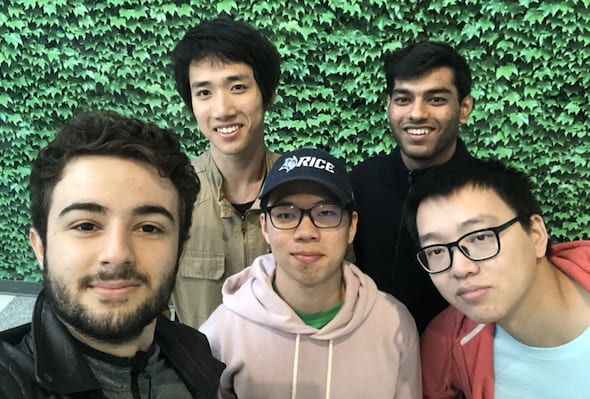
Rice’s IPT USA champions, from left: Ayush Sachdeva, Kevin Zheng, Poom Kritpracha, Matheus Barbosa and Xinyun Liu. Photo courtesy of Matheus Barbosa
Five Rice students head to Warsaw in April to take on international opponents
Rice University undergraduates will test their physics chops in Poland next April after winning the right to represent the United States in the International Physicists’ Tournament (IPT), the “World Cup of physics.”
The team of five students beat competitors from the University of California, Berkeley, and the University of California, Merced, in the three-round IPT USA event at Berkeley Dec. 7-8. The competition challenged each team to solve 17 mind-bending physics problems.
Led by sophomore physics and mathematics major Matheus Barbosa, the team claimed by victory by a slim nine points. Members include freshmen Poom Kritpracha and Ayush Sachdeva, senior physics and computer science major Xinyun Liu and sophomore physics major Kevin Zheng.
The team was the first from Rice to enter the national challenge, so it will also be the first to compete internationally.
“We are very excited about this,” said Doug Natelson, professor and chair of the Department of Physics and Astronomy. “It’s great that a team of Rice students will be representing the U.S. on the world stage.”
Barbosa brought the students together when he heard about the challenge and knew of others who, like he, had competed in similar events. Together they divided the theoretical and experimental problems among themselves, deciding which they would take on.
“You need to have a strategy, because they’re going to challenge you on one problem or another out of the 17, and you can only have six denials,” Barbosa said. “If you have less than 11, you incur the risk of losing points.”
The juried “physics fights” mimic the peer-review process for research, with each team alternating the roles of reporter, opponent and reviewer.
Of the problems, Barbosa said his team’s best effort was on the “cumulative cannon,” a challenge to figure out why a pingpong ball bounces higher when floating in a cup half-full of water than on its own.
“Our answer was that when the cup filled with water falls, there’s a pressure wave in the water that shoots the ball out,” he said. “It’s as if the gravity over the cup had increased, but with that, the weight of the water becomes higher and the buoyant force becomes higher as well.”
For the international event, the team anticipates having to solve each of the 17 puzzles. The pressure is on.
“We have a lot of problems to work on, and a lot to prove as well,” Barbosa said. “But given our experience in other competitions and in the nationals as well, we have good odds.”
The team may add a sixth member and expects to travel with a faculty adviser to Warsaw for the April 12-17 competition.

